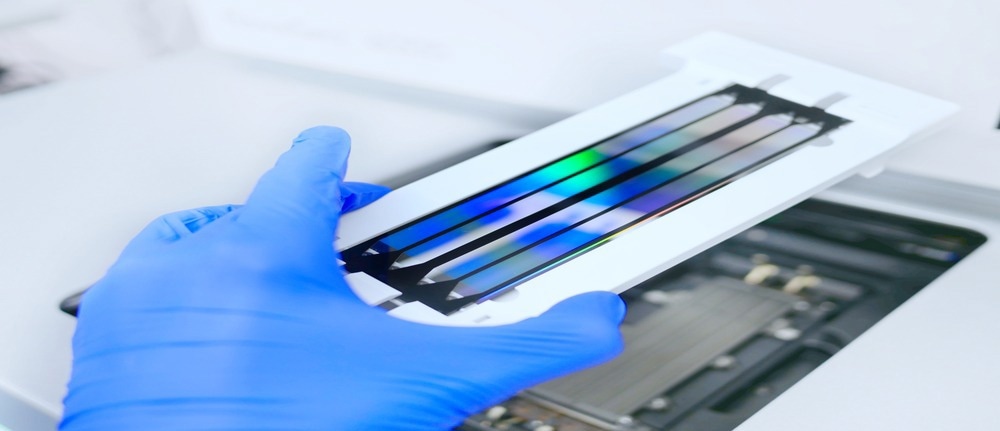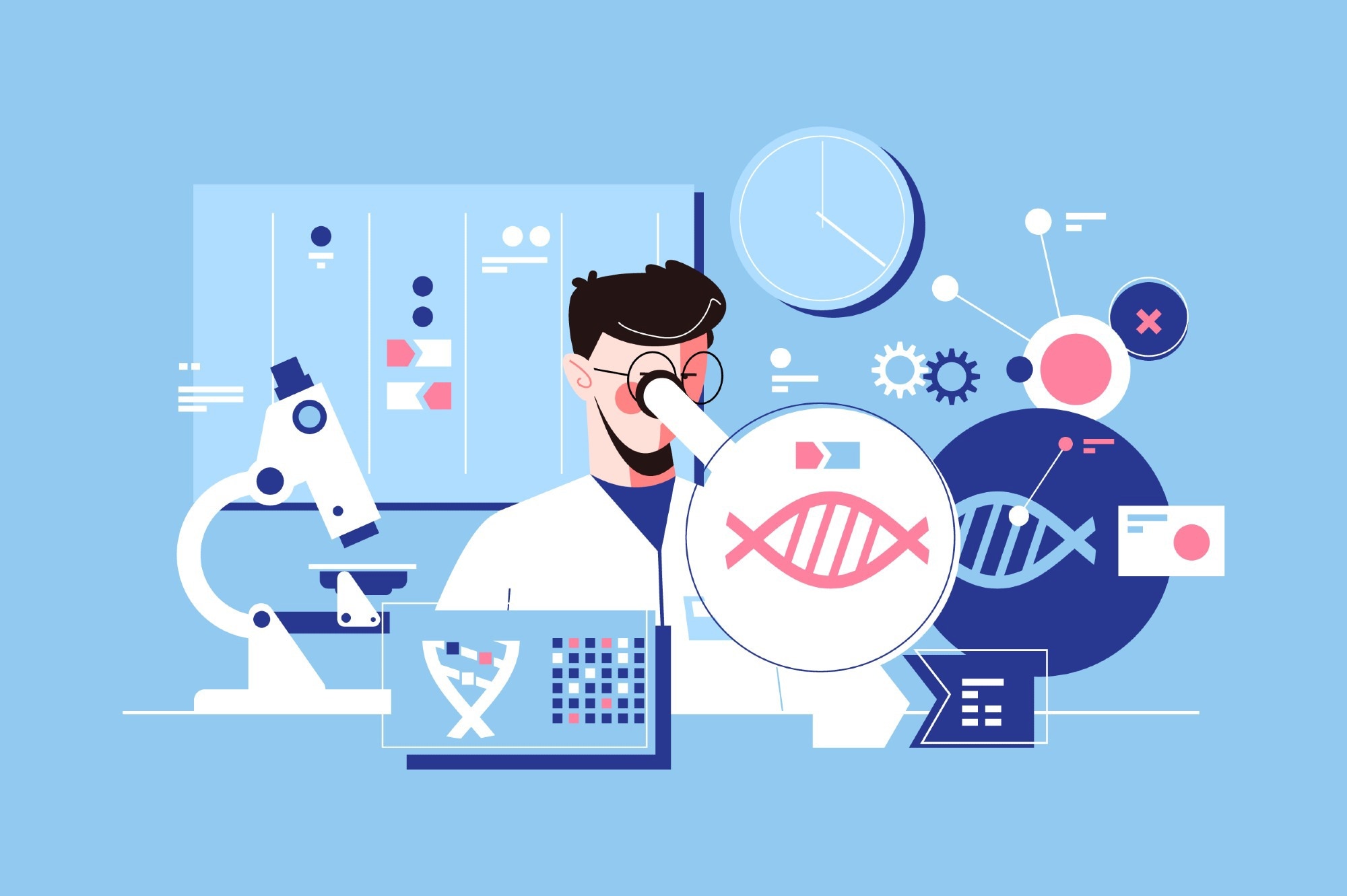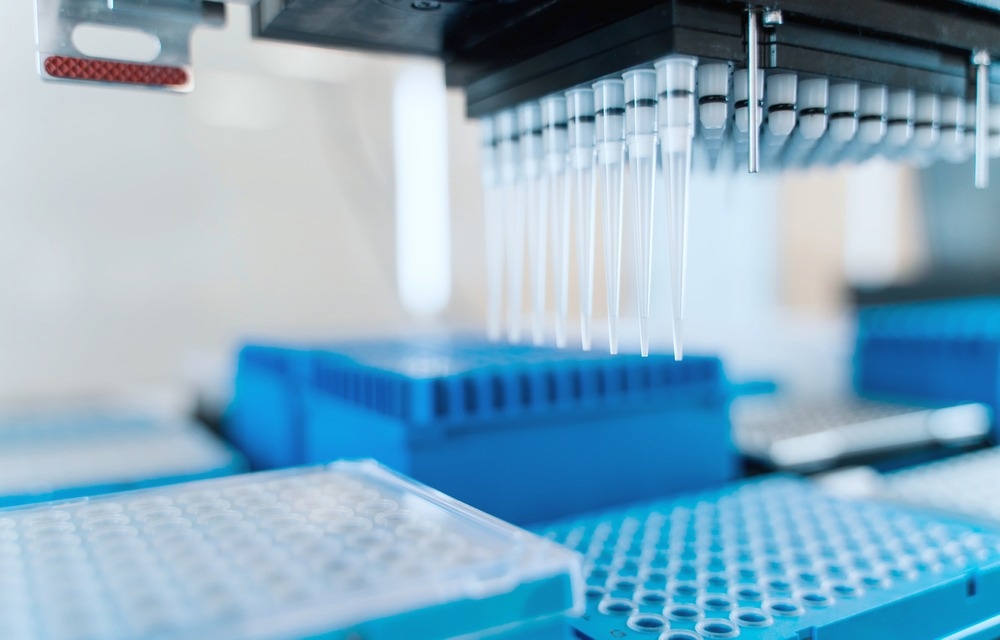Sponsored Content by TecanJun 29 2022
As part of our SLAS Europe 2022 coverage, we speak to Ian Shuttler from Tecan about their new MagicPrepTM NGS technology and how it is helping to accelerate life sciences research.
Please could you introduce yourself and tell us about your role at Tecan?
My name is Ian Shuttler, and I am part of the Lifecycle Management Business Team. For the last three years, I have been the program Project Manager for the MagicPrep NGS project.
Tecan is a world leader in healthcare innovation. Can you tell us more about some of your core values?
The core values at Tecan are very much about enhancing the capabilities of life science research and accelerating that research into the clinics, improving healthcare outcomes for people. So really improving lab processes, improving reproducibility and reliability, simplifying those processes, and enabling the research to be transmitted faster into the clinics.

Image Credit: Elpisterra/Shutterstock.com
Next-generation sequencing (NGS) has revolutionized biological science helping to answer complex genomics questions. However, library preparation can often be time-consuming. Why is this?
Simply put, it is a long, complex process. In principle, you have to do library preparation to enable you to get to the sequencing data, which requires several specific steps. There is extraction- separation - from your core material, and then there are various chemical steps along the way to ensure that you obtain a library that can then be run on a sequencer.
Of course, I am not a genomics expert nor a molecular biologist, so I may not be the best person to answer this question, but the reason primarily is that there are a lot of incubation steps; there is PCR steps, magnetic bead separation, and these are processes that many companies have established over many, many years which is known to be long, tiresome, and tedious.
You’ve recently launched your new product MagicPrep NGS, which is able to complete NGS library setup in 10 minutes. Can you tell us more about some of the reasons why you decided to develop a product in this space?
This goes back to our values about simplifying and improving lab processes so that research can move faster into healthcare and clinics. We know that NGS library preparation is long: it is tedious, time-consuming, and people make mistakes. We found that this was an ideal opportunity.
We have our DreamPrep products, Fluent, and our EVO liquid handling platforms, where big labs are undertaking a great deal of work and where samples can automate their systems. That way, we saw an opportunity in the market for smaller, low-throughput labs that could not justify a large complex liquid handling system.
MagicPrep NGS can undertake up to eight samples at a time and is very simple and straightforward to use. With a quick setup – under 10 minutes – you can simply press the button and return when it is finished.
The MagicPrep NGS removes that tedium, taking away that time that one, in principle, could be spending at the bench – allowing the user to go off and do other, perhaps more creative things.
Many smaller labs are doing NGS research and undertaking genomic sequencing research but simply do not have the throughput to justify the larger, more expensive systems with all their inbuilt capabilities. We felt that there was definitely a need for something small, compact, and easy-to-use that would provide those clients with that level of automation.
MagicPrep™ NGS – Library prep that just works!
How does the MagicPrepTM NGS work, and what are its application areas within the life sciences? How successful is the MagicPrepTM?
We launched the MagicPrep on the 28th of April. It has not been released for that long, but I am pleased to say that we have had a tremendous amount of interest, with lots and lots of people contacting us and interested in seeing the instrument.
We are pretty excited about the response that we have had from customers and potential customers out there. What you get with the MagicPrep NGS system is both the instrument and the reagent kits. The reagent kits cover DNA-Seq, both mechanically fragmented and enzymatically fragmented, and mRNA-Seq. Those are the fundamental building blocks of - and cover the core area of - the sequencing market. This means that they are applicable to many labs.
That is the core area that combines our reagent knowledge at our Tecan genomics facility in Redwood City, in the Bay Area, with our liquid handling knowledge throughout Tecan. We are well known in that area, and for our manufacturing skills and facility in Austria as well.
Essentially, all you need to provide are your samples and a pipette. We provide magnetic beads. We provide every bulk reagent; everything comes fully sealed in a reagent kit. The user does not need to provide any further pipette tips, plastics, make up buffers, or anything else: it is all completely contained.
The user simply needs to load their samples with the magnetic beads; mix; insert them into the instrument (which takes about 10 minutes); press ‘Start,’ and then they can leave and come back much later – approximately 5.5 hours for DNA, or 10-11 hours, depending on the number of cycles, for mRNA. We wanted to provide a complete solution.
Alongside its quick speed, what are some of the other advantages Magic NGS has over other technologies available in this space?
One of the critical things about Magic NGS is that our team has been very innovative in the arrangement, the internal design, how it all works, and some of the technologies we developed inside.
It does not require customers to make any changes because it uses the same volumes they would use in their manual kits. The output at the end is the same volume they would expect if they were doing the manual process. This means that it is fully compatible with - in principle – their pre-existing workflows and experimental approaches in their laboratory.
It uses thermal cycling and magnetic bead separation (that everyone is used to) and includes a pipetting engine and a dispensing mechanism. These are then designed to ensure that the library prep is reliable, reproducible, and matches what they are used to doing today. Tecan Genomics had had prior experience with microfluidics electrowetting which was not necessarily successful. This was one main reason our organization adopted this approach, which we feel is more robust and reliable.
When we receive customer feedback, we note that when we visit clients to train them on how to use the product, they have often set aside several hours for the workshop. After about 20-30 minutes, they often realize that no more time is needed – because the installation and training is just that simple. I could teach someone how to use this instrument in 10 minutes.
The other important thing with this machine is that the input volumes that the user is pipetting into the system with the magnetic beads are the same as customers are using today with the existing manual kits: the output volumes that they get – so the 30 microliters of the prepared library - is compatible with all of the processes that the customer is used to.
Therefore there is no change for them within the workflow and their process. We felt that was really important, as some of the other technologies and microfluidic devices are difficult to maneuver both in the sense of getting samples in and out and the fact that there were very small volumes, which are then difficult to handle. This was, therefore, really important for us because we had previous experience in that area (as the earlier form of Tecan genomics) that we- and they as a team - wanted to eliminate.
Inside, there is a highly innovative and clever arrangement of the pipetting engine; the reagent cartridge, the sample preparation deck, the blister, and the reagent dispensing mechanism. There is a PCR thermal cycler and a magnetic bead unit in there. This mimics that sort of process that the user is used to, automating it in a fully dedicated system, and is very easy to use.

Image Credit: Kit8.net/Shutterstock.com
By having NGS library preparation run setup complete within 10 minutes, researchers are able to spend more time on what matters most, the science. How important is this for continued innovation within the life sciences?
Steve Reese gave a lecture which had a really fantastic story of how many of the developments. Let us look back from when DNA was first discovered, all the developments, the speed and improvements in sequencing, and the ability to extract all that information and data. I think that can only continue to accelerate.
Simply put, products like the MagicPrep NGS free up the time of researchers. Researchers are not stuck at the bench, preparing, manipulating liquids, or doing all the necessary processes. Instead, they can spend their time designing better experiments and analyzing their data. This is an iterative process to improve their research and focus more on the research.
If we can automate that time and make it much more robust and simpler to set up and get your samples out at the end, then that will help them accelerate their research.
You exhibited at the SLAS EU 2022 conference, showcasing your new MagicPrepTM NGS. What are the advantages of showcasing new products at in-person conferences? How does this help to build your customer relationships?
I think it is great to all be back to an in-person meeting. Some of the virtual conferences I have attended as an exhibitor have not had the same impact as face-to-face exhibitions or conferences. People can come by, and I think people like to see things for themselves.
Seeing is believing, and the discussions you can have in person can often go in different directions, which you often do not have in virtual communication. We have kept things going. We have kept meetings going. We have kept the exchange by communicating, but I think meeting customers face to face and having discussions with colleagues and customers here is really important because customers see things. They do all of their research online, so they really want to see it in the flesh.
Bringing a new product to market requires a great deal of teamwork. How important is collaboration to Tecan?
I think collaboration is essential and will only get more and more important in the future. We have always been a team-based collaborative organization, but the MagicPrep NGS project and product and system were very much a tight collaboration between our reagent genomics company in Redwood City and the Bay Area.
Obviously, many of our partnerships were heavily involved: our liquid handling expertise and plastics design expertise with colleagues in Switzerland and elsewhere, and the suppliers we have built long-term relationships with for all of our plastic materials.
We have also decided to use our development factory in Austria to manufacture the instrument. This means that there is a whole sort of collaborative nature across the whole company, bringing all of this together.

Image Credit: Andrii Yalanskyi/Shutterstock.com
Are you hopeful that by providing a revolutionary technology for NGS, we will see new research becoming available? What does this mean for new discoveries?
It is difficult to answer this from Tecan’s perspective because it is in the hands of our customers: it is in the hands of our people who are going to be using and utilizing the MagicPrep NGS in their research programs. Hopefully, we will be able to accelerate their research. It is difficult for me to say in which directions or areas of research they will be going in, but we hope it will help those customers improve their ability to make new findings and continue to accelerate the rate of pace of life science research and into the clinics and into healthcare, which is to the benefit of all of us.
If we consider, for instance, the whole COVID-19 pandemic, almost everyone in the world now understands things like lab automation and PCR; these are now household terms.
This technology would not be possible without laboratory automation which has seen a considerable increase in its adoption within life sciences practices over recent years. How vital is laboratory automation to the life sciences industry, and what role do you think it will play in research in years to come?
As I just talked about, if we look at the whole COVID-19 pandemic, all the testing and sample extraction requirements, that was a fantastic case study of how beneficial laboratory automation is. Something we see is that there comes the point in many laboratories where the sample throughput or the complexity of the process is such that you need to automate it if you want to generate the amounts of data you need.
I think an increased adoption rate of automation can be seen over the last 30-40 years in all of the companies in the laboratory automation space, including Tecan. I think that that trajectory is going to continue because even people who would not perhaps traditionally look at lab automation are now looking for ways to conduct experiments in a much more effective way, freeing up their time and automating their processes.
Frankly, it is worth the investment because then what you get is often much more reproducible, more reliable, and has to be done to get the sort of sample throughput that you want. That is what companies like Tecan are here to do. We have many specialists and experts who will take people and guide them in the right direction.

Image Credit: Elpisterra/Shutterstock.com
What is next for Tecan? Are there any exciting projects in the pipeline?
I have been in the analytical instruments or instrumentation industry for over 30 years, and all companies I have worked at are idea-rich organizations. So, there is always interesting, fun stuff to be working on. There are a number of areas in which Tecan is continuing to push forward on. I think you will expect to see new products and new developments from Tecan in the future.
Disclaimer: For Research Use Only. Not for use in diagnostic procedures.
About Dr. Ian Shuttler
Ian Shuttler is a senior scientist with more than 30 years of international experience in the analytical instrumentation industry, having worked for companies including PerkinElmer, Agilent and Tecan. Throughout his career spanning Germany, the UK, the US and Switzerland, Ian has been at the interface between R&D and business, defining, developing and launching multiple new products in a variety of markets.
Over the last few years, Ian led the MagicPrep NGS development project for Tecan. Previously, he was a member of the SLAS Board and co-chaired the first SLAS European Conference in Brussels 2018.